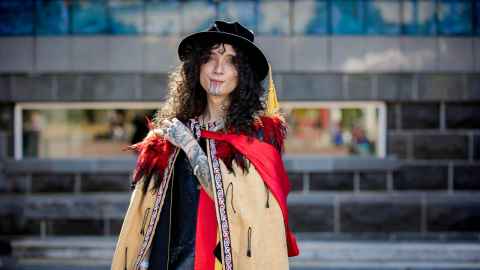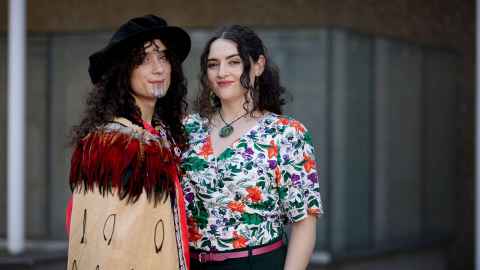Activist-turned-academic adds ‘Dr’ to her name
6 September 2024
Emmy Rākete (Ngāpuhi), a political activist for incarcerated Māori and queer communities in Aotearoa, has reached a new milestone and is now officially Dr Rākete.

On 5 September, Dr Emmy Rākete graduated with a Doctorate in Sociology from the Faculty of Arts at Waipapa Taumata Rau, University of Auckland.
She was adorned in a korowai ahead of the graduation ceremony, a prestigious honour gifted by Professor Tracey McIntosh and the Departments of Sociology and Criminology. This korowai, held in the University of Auckland's possession for many years, is awarded only as a significant honour and in this case, recognises the contribution Rākete has made to academia.
Rākete’s PhD thesis, Empire of Punishment: A Social Reproduction Theory of Mass Incarceration, earned her a spot on the Dean’s List for 2024, which recognises theses that are of exceptional quality.
However, accolades are not what drives Rākete — it’s the people she represents.
“Being on the Dean’s List is something I’m really grateful for, but I don't want the stuff that I've learned here to just be really good prose,” she explains.
“I'm not interested in writing poems that are really touching and moving, and I'm not interested in writing articles that get printed in prestigious journals, although I hope that they will.
“What I want to do is build a shared understanding of this brutal violence that's been inflicted on New Zealand's working class in pursuit of the interests of the rich – I'm trying to embody that kind of activist scholarship.”

As a queer Māori of Ngāpuhi descent and a proud Aucklander, Rākete recalls the pivotal moment she chose to champion queer rights, which soon expanded to advocating for Māori rights, particularly for those who are incarcerated.
It all began at the Auckland Pride Parade in 2015, where she faced brutality for opposing police and prison officers’ participation in the event which led to her hospitalisation with a broken arm.
"I couldn’t tolerate the fact that police were invited to use a queer platform, as though they aren’t part of the racist capitalist structure that causes harm,” she says, recalling the banner she held with her two friends that read: “No pride in prisons.”
This moment galvanised her activism and led to the establishment of People Against Prisons Aotearoa (PAPA), where Rākete has served as a spokesperson since 2017, championing the abolition of prisons.
At this point, she was already studying for her Bachelor of Arts degree from the University of Auckland, majoring in Sociology. Though she once envisioned herself as an author of horror books, the attack and subsequent hospitalisation prompted Rākete to pursue a deeper path—one where she could contribute to academic knowledge and represent her communities on a scholarly level.
“I realised that we had a really important opportunity to communicate a clear message of what was wrong, how we can fix it, so we created this organisation.”
In 2016, she met Dr Moana Jackson, a renowned lawyer who greatly influenced her and Māoridom. Rākete credits much of her inspiration to Jackson's work and legacy.
“He made sure that we knew that we had support, that I knew that I had support.”
Jackson, the late Māori legal scholar and activist, left a profound impact on Rākete. She recalls how his work was not only rigorous but also deeply political, unafraid to challenge the status quo. His dedication to justice is what she strives to emulate, courage and clarity in her own activism.
Another influence in Rākete's life is Angela Davis, the renowned American revolutionary, scholar, and activist. Meeting Davis in 2018 at the Sisters Inside conference left a lasting impression on Rākete, who admires the resilience of Davis in the face of oppression and her commitment to revolutionary scholarship.
Emmy is a critical Marxist scholar who bridges activism and academia. Her work highlights how social problems stem from the very structure of society and believes that organised class struggle is key to transforming it. She is interested in using theoretical work that can inform and guide practical action.
Media contact
Te Rina Triponel | Kaitohutohu Pāpāho Māori
E: te.rina.triponel@auckland.ac.nz